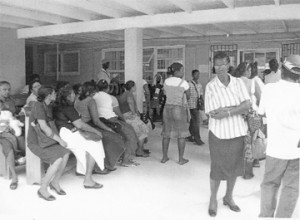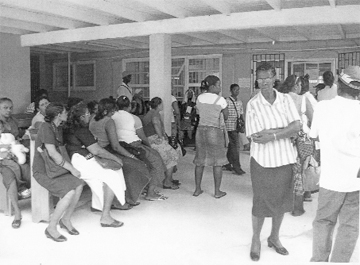Many Guyanese are walking, ticking time bombs because of the chronic non-communicable disease called hypertension for which serious complaints do not show up until years later.
The public healthcare system is yet to progress to the stage where it is okay to simply get up one morning and go wait to see the doctor for a regular check-up without being castigated for taking the place of someone with emergency complaints.

In Guyana, hypertension ranks as one of the leading contributory diseases for kidney disease, coronary heart disease, stroke and vision problems. Repeatedly, medical outreaches have found that many people are suffering with hypertension, but that they are unaware, underscoring the need for more regular medical screening in the public health system. This must be done in addition to adopting a healthy lifestyle that is critical to managing the condition for those who already have it, and for those who do not, preventing it from developing. Some of the actions that can be taken include reducing sodium (salt) intake, losing weight and exercising.
Minister of Health, Dr Leslie Ramsammy has been a strong advocate for a greater level of health consciousness in the country, frequently urging people to get serious and be more aware of what is happening with their bodies.
But even he acknowledged that the public health system continues to face the challenge of providing regular medical check-ups to those who seek it, he pointed out to Stabroek News in an interview a month ago that the plan to de-centralise health care was initiated so as to force people to visit health centres and clinics within their respective areas where regular check-ups could be facilitated, thus reducing the burden on the Georgetown Public Hospital (GPH). This has not been effective; the numbers still stack up at the GPH.
He said the system prioritizes emergency cases at the Accident and Emergency Unit of the GPH and also makes provision for other medical complaints at the Outpatient Depart-ment of the hospital, but noted that it currently lacks the capacity to service persons seeking regular check-ups.
Ramsammy said that if Guyanese became more health conscious the country’s health issues would reduce significantly, but added that facilities would have to be put in place to support the behavioural shift.
The Ministry of Health is currently working on resuscitating a health clinic at its Brickdam location that would be open to anyone in need of a check-up. Ramsammy said the clinic was under-utilized in the past and therefore discontinued. Still, he hopes the system can again offer the services given the urgent need for locals to visit the doctor on a more regular basis.
He said that there are going to be criticisms about public health care, but noted that the administration is still working to bring about the desired changes. They are not going to be effected tomorrow, maybe not in another five years, but he is adamant that the day will come.
Aspirin solutions
at outpatient
At 9 am on any given day of the week close to 60 persons are waiting to see the doctor at GPH outpatient department, by 1 pm it is close to 90. No one is bleeding or screaming out in pain for medical attention but there is grimacing and disgusted expressions just about everywhere.
The complaints often range from a nagging headache, to a stomach problem to an irritating cough and knee and back injuries. Once, during a visit to the location, Stabroek News found a woman complaining of just feeling depressed and wanting to end it all. The outpatient department has a numbering system and the woman’s number was 84. When she left at midday, still not having seen a medical practitioner, her number was still a really long way from being called. Nurses were only just triaging patient number 25.
Some of the men assembled at the outpatient department on another day were aggressive even as they winced in pain and cried out for attention – clashing with security guards and threatening other patients – while begging the nurses to let them in the door. Not surprisingly, many of the patients are from out of town, some as far as Linden.
During one of this newspaper’s visits, there was a woman there from the hinterland. She had travelled hundreds of miles to the GPH having had a fall; she was vomiting blood.
A quick scan revealed that many patients had complaints of nagging headaches, and many of them had had them for years. Aspirin had been their saviour, temporarily relieving the pain and allowing them to function “like before”, according to one man. Some of these patients suspected that they might be hypertensive and those who actually managed to see the doctor that day had their fears confirmed.
Asked about having regular medical check-ups, one patient said they were, “a waste of time and money spend travelling to town” since it takes about three attempts before getting in to see a doctor at outpatient. And then when one was successful, the man said, the doctors are confused as to why someone would turn up for check-ups when there were people outside waiting with “more serious complaints”. The patient described it this way: “You go in and they vex cause you ain’t sick. So what they the doctor does do is look at you and say everything okay without even checking you. But the health minister telling we to get check-ups to avoid coming down with something serious,” the man declared while holding up a placard that detailed the benefits of regular check-ups.
He was visibly upset because he had been at the hospital the day prior and a nurse had told him that if he was not ill he should go back home and stop “wasting people time”.
However, it is not simply the lack of adequate medical personnel that creates the problem at outpatient; it also has to do with their working conditions and their attitude to work. Doctors do not see patients during power outages because the place is too hot. Once the electrical fans stop spinning work also halts. And the unpleasant attitude of some nurses has turned away many a patient.
In its defence, the hospital has repeatedly said the actions of a few medical personnel do not determine hospital policy. However the administration must be aware that this reflects poorly on the institution. If the power outage lasts for an hour, tools remain down for that period and the numbers waiting to see the doctor gradually swell. Perhaps the man waiting for a check-up, who can possibly only get in on that day, is seated among those outside and is affected by the delay.
During one of this newspaper’s visits, there was such a man; he left around 4.35 pm vowing to go home and die if he must; though he did not appear ill.
The outpatient department’s regular workday ends at 5 pm, but if there are patients still there at that hour, it would sometimes work for extended hours. The man was simply frustrated.
People with myriad medical complaints can usually be found sitting at the outpatient department and there are those who just want to know if everything is okay. With private hospital consultation fees at $1,500-$3,000, many people prefer to wake up early and sit in line at outpatient from as early as 5 am; and they will endure the delays, the verbal spats and any sort of attitude just to see a doctor.
There is one way to avoid the long lines. The GPH offers a complete medical check-up to those desirous of having one at the cost of $7,000. The question is how many people would be able to afford it.
Ramsammy said that people should not be forced to resort to paying for services that they can
receive for free. He said that that particular service was initiated for persons seeking medical examinations for travel purposes.
High blood pressure/
hypertension
High blood pressure is a typical chronic disease, which gradually wrecks the body if it goes undetected, chipping away at the important organs like the kidneys and the heart while attacking the brain and the eyes. Its symptoms can include headaches and blurred vision. Uncontrolled high blood pressure can lead to a stroke by damaging and weakening the brain’s blood vessels, causing them to narrow, rupture, or leak.
The destruction is far from over. High blood pressure can cause changes to the cells lining the arteries reducing the ability of the arteries to dilate, which can cause chest pain, or a heart attack.
If the blood pressure is well controlled, you’re more likely to keep the most severe problems at bay.

